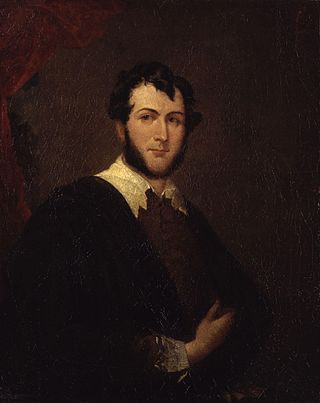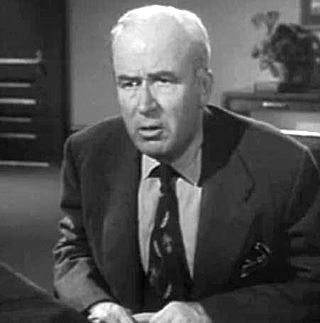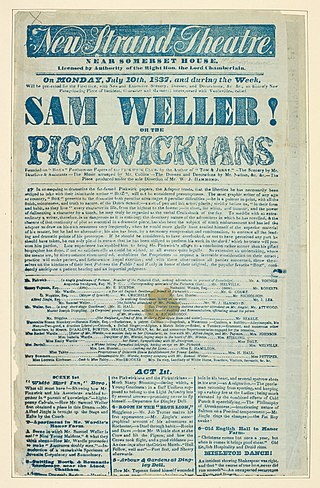Related Research Articles

Sir Henry Raeburn was a Scottish portrait painter. He served as Portrait Painter to King George IV in Scotland.

John Leech was English caricaturist and illustrator. He was best known for his work for Punch, a humorous magazine for a broad middle-class audience, combining verbal and graphic political satire with light social comedy. Leech catered to contemporary prejudices, such as anti-Americanism and antisemitism and supported acceptable social reforms. Leech's critical yet humorous cartoons on the Crimean War helped shape public attitudes toward heroism, warfare, and Britons' role in the world.

The Voyage of the Beagle is the title most commonly given to the book written by Charles Darwin and published in 1839 as his Journal and Remarks, bringing him considerable fame and respect. This was the third volume of The Narrative of the Voyages of H.M. Ships Adventure and Beagle, the other volumes of which were written or edited by the commanders of the ships. Journal and Remarks covers Darwin's part in the second survey expedition of the ship HMS Beagle. Due to the popularity of Darwin's account, the publisher reissued it later in 1839 as Darwin's Journal of Researches, and the revised second edition published in 1845 used this title. A republication of the book in 1905 introduced the title The Voyage of the "Beagle", by which it is now best known.

George Cruikshank or Cruickshank was a British caricaturist and book illustrator, praised as the "modern Hogarth" during his life. His book illustrations for his friend Charles Dickens, and many other authors, reached an international audience.

John "Jack" Sheppard, or "Honest Jack", was a notorious English thief and prison escapee of early 18th-century London.
Henry Colburn was a British publisher.

Captain Cowper Phipps Coles, C.B., R.N., was an English naval captain with the Royal Navy. Coles was also an inventor; in 1859, he was the first to patent a design for a revolving gun turret. Upon appealing for public support, his turrets were installed on HMS Prince Albert and HMS Royal Sovereign. Coles died in a maritime accident in 1870 when HMS Captain, an experimental warship built to his designs, capsized and sank with him on board.

Colonel Thomas Brooke Jr. of Brookefield was President of the Council in Maryland and acting 13th Proprietary Governor of the Province of Maryland. He was the son of Major Thomas Brooke Sr. and Esquire (1632–1676) and his second wife Eleanor Hatton (1642–1725) who later remarried Col. Henry Darnall (1645-1711).
Artist and the Author is a pamphlet written by George Cruikshank in 1872. During the late 1860s, Cruikshank claimed to be the author of works attributed to other writers, including Charles Dickens and William Harrison Ainsworth. After John Forster contradicted Cruikshank's claims to having "originated" Oliver Twist, Cruikshank began a dispute in The Times as being the creator of novels attributed to Ainsworth. After the newspaper stopped carrying the dispute, Cruikshank produced all of his claims in Artist and the Author, where he disputed his relationship to 8 of Ainsworth's novels.

Ben & Holly's Little Kingdom is a British preschool animated television series. The show was created by Neville Astley and Mark Baker, and produced by Astley Baker Davies and Hasbro Entertainment. Many of the voice actors who worked on Peppa Pig have lent their voices to the show; these include John Sparkes, Sarah Ann Kennedy, David Rintoul and David Graham. The music is produced by Julian Nott, who is noted for his Wallace and Gromit and Peppa Pig scores. Ben & Holly's Little Kingdom is the third show to be produced by Astley Baker Davies. Series 3 is coming in 2024.
Anthony Hammond (1668–1738), of Somersham Place, Somersham, Huntingdonshire and Lidlington, Bedfordshire, was an English official and Tory politician who sat in the English and British House of Commons between 1695 and 1708. He was also known as a poet and pamphleteer.

Credulity, Superstition and Fanaticism is a satirical print by the English artist William Hogarth. It ridicules secular and religious credulity, and lampoons the exaggerated religious "enthusiasm" of the Methodist movement. The print was originally engraved in 1761, with the title Enthusiasm Delineated, but never published. The original print may have been a response to three essays published by Joshua Reynolds in The Idler in 1759, praising the sublime work of Italian Counter-Reformation artists. It certainly satirized both the English connoisseurs' enthusiasm for old masters and Roger de Piles's Balance de peintres, which was much discussed among art critics in the eighteenth century. However, Hogarth reworked the engraving before publishing it on 15 March 1762 as Credulity, Superstition and Fanaticism: A Medley, now laying more stress on Methodist fanaticism and echoing his earlier print, The Sleeping Congregation of 1736, in which an Anglican clergyman's boring sermon puts his congregation to sleep.

Harry Shannon was an American character actor. He often appeared in Western films.

The Lyceum Theatre was a theatre in New York City located on Fourth Avenue between 23rd and 24th Streets in Manhattan. It was built in 1885 and operated until 1902, when it was torn down to make way for the Metropolitan Life Insurance Company Tower. It was replaced by a new Lyceum Theatre on 45th Street. For most of its existence, the theatre was home to Daniel Frohman's Lyceum Theatre Stock Company, which presented many important plays and actors of the day.
Stephen Cassan (1758–1794) was an Irish barrister in Calcutta, where he was one of the founders of the Bengal Journal. He was High Sheriff of Calcutta in 1785.
Captain William Davies MBE was a British sea captain and business man, a founding partner in the City of London shipping company Davies and Newman and Chairman of the London General Shipowners Society.
Angus McBean, or as he was otherwise known by his family Æneas McBean was a Scottish minister and Covenanter. He was the last Presbyterian minister deposed under Episcopacy.

Samuel Weller, or, The Pickwickians is an 1837 comedy in three acts adapted from Dickens's novel The Pickwick Papers by William Thomas Moncrieff. It was first performed at the Royal Strand Theatre in London on 17 July 1837.
References
- ↑ "Singular Account of Mr. Booty". The Telescope . William Burnett & Co. 1824. p. 79. Retrieved 5 December 2010.
- ↑ Dyer, Thomas Firminger Thiselton (1898). The ghost world. Ward & Downey. pp. 241–243. Retrieved 5 December 2010.
- 1 2 "The Baker of Wapping". The Idler, and breakfast-table companion. Vol. 1. George Denney. 1837. pp. 36–37.
- ↑ Moncrieff, W. T. (1830). Old booty! : A serio-comic sailor's tale. Robert Cruikshank (illus.). London: William Kidd, 6, Old Bond Street.